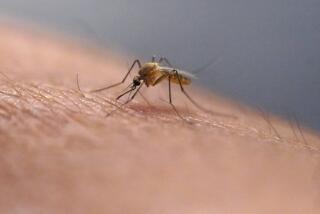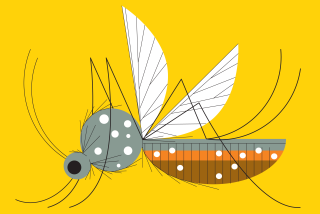10 ways to keep yourself safe from Zika, now definitively linked to birth defects

A medical researcher uses a monitor that shows the results of blood tests for various diseases, including Zika, at a lab in Panama. There is currently no vaccine to prevent the Zika virus.
The Zika virus transmitted by mosquito bites definitely causes severe birth defects, the Centers for Disease Control announced Wednesday. That makes it even more important to protect yourself from the bite of the Aedes mosquito.
Zika poses a particular threat to pregnant women because of a birth defect it causes in newborns called microcephaly and other brain abnormalities.
Many cases have been reported in Brazil, but the Zika virus has also become more widespread in the United States, the CDC said, showing up in as many as 30 states, including California, and in Puerto Rico.
That raises the question: How do you keep yourself safe from something that prevalent? There’s no current vaccine available for Zika.
California had 29 confirmed cases of travel-associated Zika as of April 6. None of the 346 confirmed cases nationwide are attributed to bites from local mosquitoes carrying the virus.
However that’s not true of U.S. territories. The Aedes mosquitoes, which spread Zika, have been the source of 351 cases in Puerto Rico, the U.S. Virgin Islands and American Samoa.
FULL COVERAGE: Zika virus outbreak >>
No one can completely avoid getting bit by mosquitoes when traveling to affected areas, but steps can be taken to try to minimize your exposure. Here are 10 tips that may help.
1. Areas affected by the Zika virus include Mexico, Central America, South America and the Caribbean. You’ll find a map and countries listed on the CDC’s website.
If you are pregnant, you shouldn’t travel to areas below 6,500 feet in altitude where Zika cases have been reported.
In fact, the CDC discourages pregnant women generally from traveling to places where Zika is spreading (Latin America and the Caribbean).
If you have booked your trip, see if you can cancel and receive a refund due to your pregnancy and the Zika risk at your destination. If you can’t get a refund and decide to go, Dr. Amesh Adalja at the University of Pittsburgh Medical Center for Health Security in Pennsylvania, says: “Practice meticulous prevention.”
2. If you are pregnant and your partner has visited an affected area, the CDC recommends abstaining from sex or using a condom. Experts say Zika virus may remain in semen for months, posing the risk of sexually transmitting the disease.
3. Use Environmental Protection Agency-registered insect repellents that contain DEET, picaridin, oil of lemon eucalyptus or IR3535. Make sure you apply it to all exposed skin.

4. Read directions and apply insect repellent correctly. For example, travelers should apply sunscreen before repellent, not on top of it.
“Apply and let sunscreen dry before using insect repellent. You want the mosquito to land on the repellent, not your sunscreen,” travel medicine and public health specialist Dyan Summers says.
She recommends an insect repellent with 20% to 35% of the chemical DEET; more than 35% of the chemical known as diethyltoluamide can irritate skin.
The National Pest Management Assn. made a “how to” video that shows you how to properly apply insect repellent. Outdoor clothing and gear store REI offers a chart that shows what’s in different repellents and how different types measure up.
5. Minimize exposed skin and wear light-colored long sleeved shirts and pants. Cindy Mannes of the pest association said mosquitoes are drawn to dark colors, floral patterns and sweet perfumes.
6. Wear clothing treated with permethrin, a chemical used as an insecticide. Insect Shield is a permethrin treatment for fabrics that offers protection though 70 machine washings.
Outdoor clothing manufacturer ExOfficio introduced Insect Shield garments in 2004. Its Bugsaway line includes shirts, pants, hoodies, hats and socks.
Other retailers that make similar bug-averse clothing include White Sierra and Outdoor Research.
7. Treat your own clothes, shoes, tents, etc. with a permethrin spray. Cutter insect repellent offers a popular spray for clothes and skin.
8. Sleep under mosquito nets with windows and doors closed or securely screened if there is no air conditioning.
9. Make sure there’s no standing water outside your lodging because mosquito eggs hatch in water.
10. Make yourself less appealing to mosquitoes by wearing deodorant and -- believe it or not -- avoiding drinking quite so much beer. Why?
Dr. Aileen Marty at Florida International University’s Herbert Wertheim College of Medicine says mosquitoes are drawn “to stinky bacteria” on our skin and odors such as beer breath.
“Researchers believe the pests are attracted to odor and breath changes caused by alcohol,” Marty writes via email.
The CDC on Monday said it would seek $1.9 billion in emergency funding from Congress to develop a vaccine against the disease. It also said there may be hundreds of thousands of infections in Puerto Rico.
The CDC’s website also tells travelers that mosquitoes that spread the Zika virus bite mostly during the daytime, and the same mosquitoes that carry the Zika virus also spread the dengue and chikungunya viruses.
MORE:
Should you avoid travel to areas affected by the Zika virus?
Marketing fee from HomeAway prompts owner anger and lawsuit
5 reasons to consider an Alaska cruise (beyond escaping the Southern California heat)
More to Read
Sign up for The Wild
We’ll help you find the best places to hike, bike and run, as well as the perfect silent spots for meditation and yoga.
You may occasionally receive promotional content from the Los Angeles Times.





